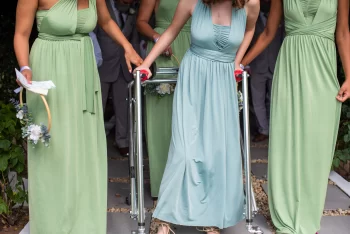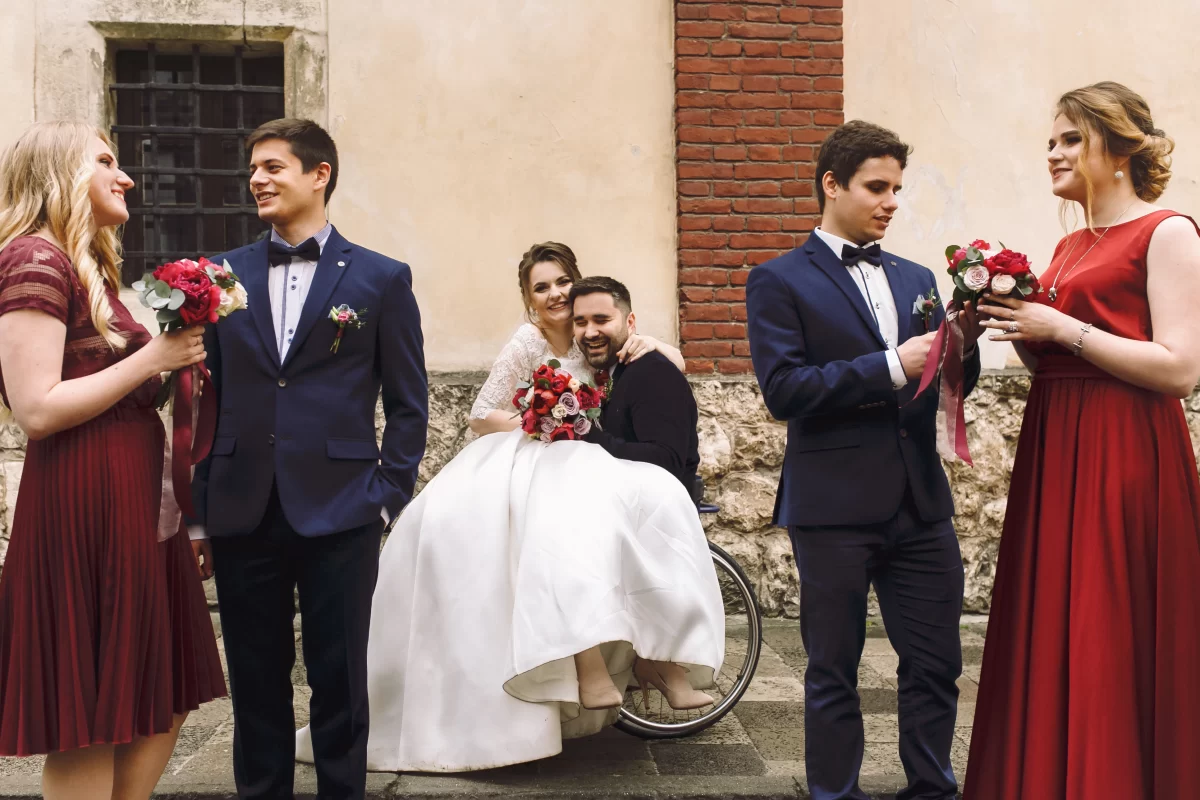
Everyone deserves a beautiful wedding that suits them down to the ground. This might mean getting married outside, or involving your children. Or it might mean making sure your wedding is accessible.
There are a lot of decisions to be made when planning a wedding, from location to wedding venue to the size of the event. Would you like a small wedding or something on a grander scale? Each of these choices will have an impact on how accessible your big day is. That’s even before you start thinking about the ceremony.
The ceremony will be the heart of your wedding. A good ceremony will express your love story. It puts into words the bond between you and your partner, celebrating and cementing it in front of your nearest and dearest.
It’s worth saying here that a traditional wedding ceremony could present barriers. That could make you, the happy couple – or your guests – feel excluded. But with good planning that needn’t be the case and you can have a truly accessible wedding.
One of the wonderful things about a humanist wedding is that it allows couples to shape the ceremony to fit you and tell your love story.

So, here are five tips for planning your accessible wedding:
Wedding planning can be joyful, but it can also be tricky, with lots of different priorities competing for your attention. These tips will make it easier to plan your wedding to be inclusive and welcoming for all.
-
Find the right celebrant
This is excellent advice for anyone planning a wedding, but it’s especially important for disabled brides and grooms. You need to feel completely happy that your celebrant ‘gets it’ and will help make your day fun, memorable and accessible. From this decision everything else will flow. Celebrants in our network are all trained in providing bespoke ceremonies. Some even have specific access experience (see below for their details).
-
Throw out wedding traditions that aren’t accessible to you
Traditions can be wonderful things that link us together in time, but they can also be restrictive. Your wedding doesn’t need to include any tradition that isn’t comfortable and fitting for you. Lots of standing is inaccessible? Have a seated ceremony. Don’t want to read vows aloud? Ask your celebrant to read them for you. There are lots of small things that can make your day work wonderfully for you.
-
Think about pace and space
 A humanist wedding doesn’t have to fit a traditional format. You can pace it out to suit you. If a long service would be difficult for you to participate in, or for your guests to make it through, let your celebrant know. Together you can build a ceremony that suits you. A humanist wedding can also take place anywhere. Yes, this means that you can choose a personal and significant location to get married. It also means that you can pick a space that you find accessible. Perhaps because it has soft lighting or gentle acoustics. Or because it offers enough space to allow a comfortable distance between you and your guests. The flexibility of a humanist ceremony means it is never a ‘one size fits all’ approach.
A humanist wedding doesn’t have to fit a traditional format. You can pace it out to suit you. If a long service would be difficult for you to participate in, or for your guests to make it through, let your celebrant know. Together you can build a ceremony that suits you. A humanist wedding can also take place anywhere. Yes, this means that you can choose a personal and significant location to get married. It also means that you can pick a space that you find accessible. Perhaps because it has soft lighting or gentle acoustics. Or because it offers enough space to allow a comfortable distance between you and your guests. The flexibility of a humanist ceremony means it is never a ‘one size fits all’ approach. -
Have it at a time that suits you
That flexibility includes timings. With a humanist ceremony you can have it at a time that suits you. If getting up and out in the morning is a slow process, have the ceremony at night. If you need breaks during it, let your celebrant know. Your nearest and dearest, family and friends, will be there when you’re ready.
-
Have fun with it!
Perhaps the most important tip of all. Modern weddings offer a wonderful chance to express creativity – including being creative with access. You could swap your bouquet for a wheelchair flower train, like this bride. If you’re visually impaired we could find a ritual that engages the different senses, or include your dog in the day. Good access is generally good for everyone. So get creative and have fun making your day uniquely and memorably ‘you’!

Humanists UK Celebrants
With a humanist celebrant you can have a unique, heartfelt ceremony which meets your access needs. We guarantee that you don’t have to compromise on your ceremony to have an inclusive wedding.
In our Humanists UK celebrant network we have people with specific access experience.
Our example is Kathryn, who has 15 years experience in inclusive participation and a lifetime of lived experience as a proud Disabled Person. She has a great blog about accessible weddings on her site. Here are some of her examples of ways to make your wedding ceremony inclusive:
- Need it super short so you’re not overwhelmed? Of course!
- Want to avoid walking down an aisle? You got it!
- Rather not feel like the centre of attention for too long? No problemo!
- Want a handfasting but worried about your dexterity or mobility? Sorted!
- Need to skip the whole “please stand, now sit, now stand again” shebang? Yes!!
- Something else? Coolio, let’s make a fabulous plan so you both feel good!!
Humanism
How do you know if you’re a humanist? Take our quiz and find out!
Find your local celebrant
Planning your wedding and would like to explore having a humanist ceremony? Find your local celebrant on our map and get in touch.





